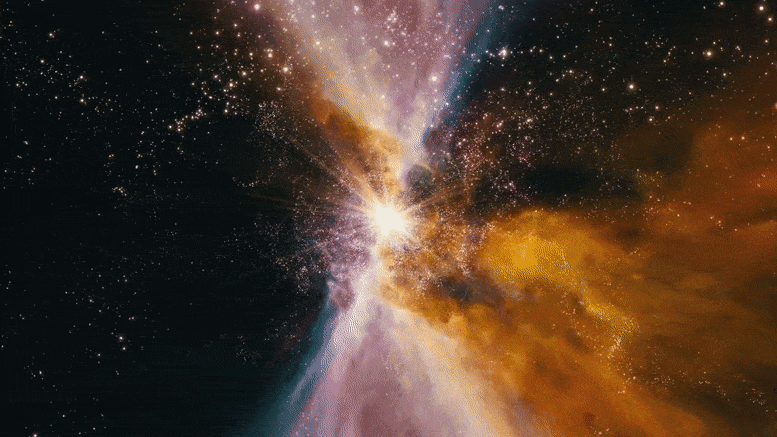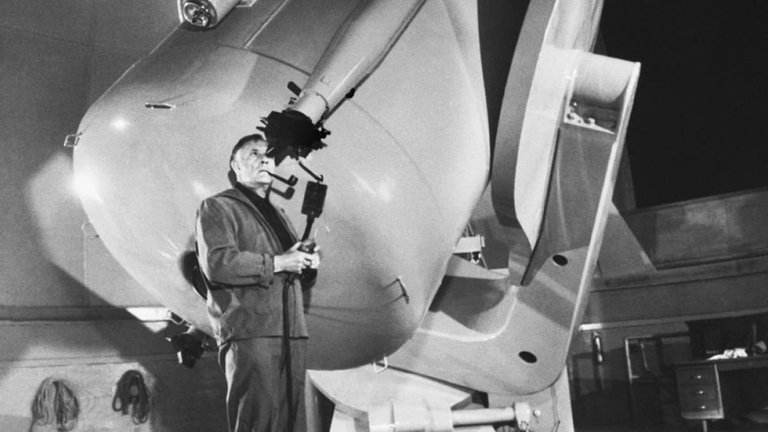
Source
Until the beginning of the last century it was believed that the entire universe was formed solely by the Milky Way, it was Edwin Hubble who discovered with his observations that many objects considered as stars were actually galaxies, even larger than the Milky Way but much more distant.
Hasta principios del siglo pasado se creía que todo el universo estaba formado únicamente por la vía láctea, fue Edwin Hubble quién descubrió con sus observaciones que muchos objetos considerados como estrellas eran en realidad galaxias, incluso mayores que la vía láctea pero mucho más lejanas.
Stellar objects such as type 1A supernovae that are known to always have the same brightness helped Edwin Hubble to calculate the distances of galaxies, in the same way that we can intuit how far away a car is depending on the size at which we see its lights. you can calculate the distance to these supernovae that are all over the universe.
Objetos estelares como las supernovas tipo 1A que se sabe que siempre tienen el mismo brillo ayudaron a Edwin Hubble a calcular las distancias de las galaxias, de la misma forma que podemos intuir a que distancia está un auto dependiendo del tamaño al que vemos sus luces se puede calcular la distancia a estas supernovas que están por todo el universo.
After his observations, Hubble came to the conclusion that the universe was not static as previously thought, but rather that the galaxies were moving away from each other in a constantly expanding universe and, in addition, the more distant the galaxies were, the faster they were moving away. one of others, that is to say that the universe is in an accelerated expansion.
Tras sus observaciones Hubble llegó a la conclusión de que el universo no era estático como se pensaba hasta el momento sino que las galaxias se alejaban unas de otras en un universo en constante expansión y, además, cuanto más lejanas estaban las galaxias más rápido se alejaban una de otras, es decir que el universo está en una expansión acelerada.

Source
From these studies the Hubble constant arises that indicates the speed at which the universe is expanding and that according to measurements made so far based on the cosmic microwave background has a value of 67.4 ± 0.5 km / sec / Mpc (km per second per megaparsec, 1Mpc = 3.3 million light years).
De estos estudios surge la constante de Hubble que indica la velocidad a la que se expande el universo y que según las mediciones hechas hasta ahora basadas en el fondo cósmico de microondas tiene un valor de 67.4 ±0.5 km/sec/Mpc (km por segundo por megaparsec, 1Mpc=3,3 millones de años luz).
But it seems that new measurements made with more advanced technologies do not coincide, instead of doing the calculations on the microwave background and extrapolating that expansion to the present, the new measurements have been made by averaging the stellar brightness of distant giant galaxies, in theory more accurate than previous measurements.
Pero parece que nuevas mediciones realizadas con tecnologías mas avanzadas no coinciden, en lugar de hacer los cálculos sobre el fondo de microondas y extrapolar esa expansión hasta el presente, las nuevas mediciones se han hecho promediando el brillo estelar de galaxias gigantes lejanas, en teoría más precisas que las mediciones anteriores.

Source
The fact is that these new measurements result in a Hubble constant of 73.3 kilometers per second per megaparsec, which is almost 10% more than previously calculated and that for cosmologists is a problem because it determines the final fate of the universe.
El caso es que estas nuevas mediciones dan como resultado una constante de Hubble de 73,3 kilómetros por segundo por megaparsec lo que es casi un 10 % más de lo calculado previamente y eso para los cosmólogos es un problema pues condiciona el destino final del universo.
But hey dear readers, I would not worry much about the end of the universe for which there are still billions of years, taking into account that in a hundred years we will all be bald.
Pero bueno queridos lectores, yo no me preocuparía mucho por el final del universo para el todavía quedan miles de millones de años, teniendo en cuenta que dentro de cien años todos estaremos calvos.
More information/Más información
https://scitechdaily.com/how-fast-is-the-universe-expanding-new-hubble-constant-measurement-highlights-discrepancy-between-estimates-of-our-cosmic-fate/
Hola @mauromar y será que si el universo se expande nosotros también nos expandimos…

Nosotros y todo lo que nos rodea y por eso no nos damos cuenta; Total somos parte de él.
Por ahora parece que solo se alejan las galaxias, a nosotros la gravedad nos mantiene enteros al menos de momento.
Puedes dormir tranquila.;-)
Congratulations @mauromar! You have completed the following achievement on the Hive blockchain and have been rewarded with new badge(s) :
Your next target is to reach 10000 upvotes.
You can view your badges on your board and compare yourself to others in the Ranking
If you no longer want to receive notifications, reply to this comment with the word
STOPSaludos @mauromar…
Tienes mucha razón, somos un pestañeo en el universo y aun así no deja de ser interesante leer sobre estos temas. Debe ser difícil plantearse soluciones de este tipo ya que para verificarlas es prácticamente imposible.
Además tienes que cagar ecuaciones. ;-D
Hola @mauromar, esto implicaría nuevos parámetros para los viajes espaciales.